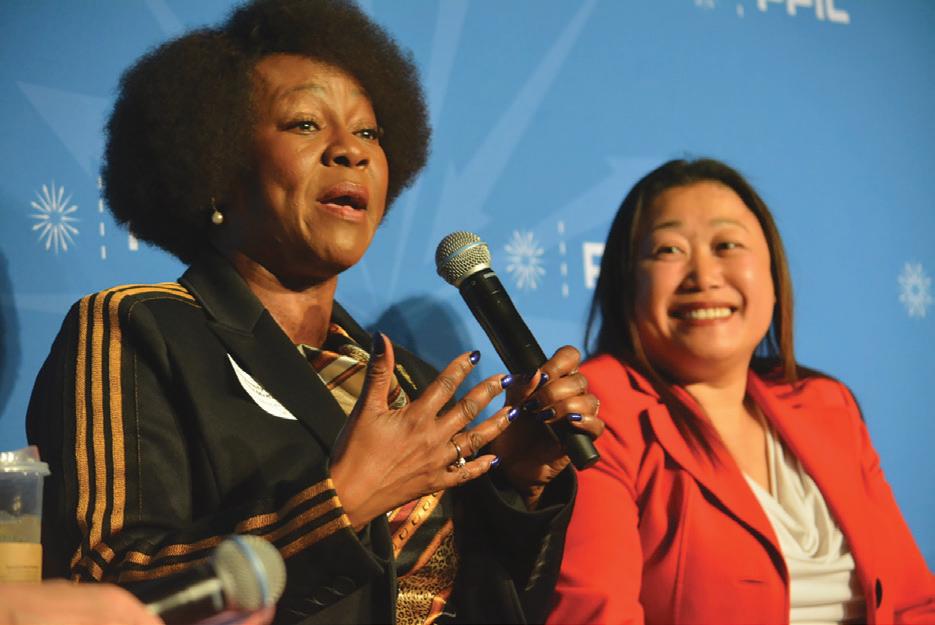
4 minute read
Asm. McKinnor Joins Panel of Legislators at Sacramento Event
Antonio Ray Harvey
California Black Media
Advertisement
Last week, Assemblymember Tina McKinnor (D-Inglewood) joined a diverse panel of women legislators at the “Women in California’s Legislature: 2023 Speaker Series on California’s Future” luncheon to discuss the essential roles they play in shaping governmental policies benefiting Californians.
The event was hosted by the Public Policy Institute of California (PPIC) at the Sheraton Grand Hotel in Sacramento.
This year’s class of legislators includes the largest number of women in state history– 18 senators and 32 assemblymembers. Joining McKinnor on the panel by were state Senators Janet Nguyen (R-Garden Grove) and Nancy Skinner (D-Berkeley), and Assemblymember Liz Ortega (D-San Leandro).
McKinnor said she made the decision to get into politics after seeing the video of police officers beating motorist Rodney King in Los Angeles in 1992.
Over the years, Mckinnor said, a major influence on her policy decisions are the learnings she gleans from raising a family.
“I think (women) bring diversity to the table because we are about taking care of our families,” McKinnor said.
“So, the legislation that you see coming out of this (panel), I believe, will be around housing, jobs, equity, and public safety. The women here are going to make a tremendous difference because we take care of our families differently.”
Before McKinnor was elected to the California State Assembly in June 2022, she served as civic engagement director for the non-profit LA Voice and previously served as operational director for the California Democratic Party and chief of staff to several members of the State Assembly. She received a Bachelor of Arts degree in accounting from California State University Dominguez Hills. McKinnor is currently chair of the Public Employment and Retirement Committee. She serves on other policy committees, including the Business and Professions Committee, Environmental Safety and Toxic Materials Committee, and the Governmental Organization Committee.
McKinnor’s legislative priorities include California’s continued COVID-19 recovery, increased funding for public education, expanded universal access to healthcare, the state’s housing and homelessness crisis, and reforming the state’s criminal justice system.
“I never thought I’d be in politics in 1992. I thought I had better get off the sofa and pay attention to what’s going on,” McKinnor said. “After that, I didn’t sit down, and I

Continued on page A8
FAIRFAX, Va. (AP) - Frozen human embryos can legally be considered property, or “chattel,” a Virginia judge has ruled, basing his decision in part on a 19th century law governing the treatment of slaves.
The preliminary opinion by Fairfax County Circuit Court Judge Richard Gardiner - delivered in a longrunning dispute between a divorced husband and wifeis being criticized by some for wrongly and unnecessarily delving into a time in Virginia history when it was legally permissible to own human beings.
‘’It’s repulsive and it’s morally repugnant,” said Susan Crockin, a lawyer and scholar at Georgetown University’s Kennedy Institute of Ethics and an expert in reproductive technology law.
Solomon Ashby, president of the Old Dominion Bar Association, a professional organization made up primarily of African American lawyers, called Gardiner’s ruling troubling.
“I would like to think that the bench and the bar would be seeking more modern precedent,” he said.
Gardiner did not return a call to his chambers Wednesday. His decision, issued last month, is not final: He has not yet ruled on other arguments in the case involving Honeyhline and Jason Heidemann, a divorced couple fighting over two frozen embryos that remain in storage.Honeyhline Heidemann, 45, wants to use the embryos. Jason Heidemann objects.
Initially, Gardiner sided with Jason Heidemann. The law at the heart of the case governs how to divide “goods and chattels.” The judge ruled that because embryos could not be bought or sold, they couldn’t be considered as such and therefore Honeyhline Heidemann had no recourse under that law to claim custody of them.
But after the ex-wife’s lawyer, Adam Kronfeld, asked the judge to reconsider, Gardiner conducted a deep dive into the history of the law. He found that before the Civil War, it also applied to slaves. The judge then researched old rulings that governed custody disputes involving slaves, and said he found parallels that forced him to reconsider whether the law should apply to embryos.
In a separate part of his opinion, Gardiner also said he erred when he initially concluded that human embryos cannot be sold.
“As there is no prohibition on the sale of human embryos, they may be valued and sold, and thus may be considered ‘goods or chattels,’” he wrote.
Crockin said she’s not aware of any other judge in the U.S. who has concluded that human embryos can be bought and sold. She said the trend, if anything, has been to recognize that embryos have to be treated in a more nuanced way than as mere property.
Ashby said he was baffled that Gardiner felt a need to delve into slavery to answer a question about embryos, even if Virginia case law is thin on how to handle embryo custody questions.
“Hopefully, the jurisprudence will advance in the commonwealth of Virginia such that ... we will no longer see slave codes” cited to justify legal rulings, he said.
Neither of the Heidemanns’ lawyers ever raised the slavery issue. They did raise other arguments in support of their cases, however.
Jason Heidemann’s lawyers said allowing his exwife to implant the embryos they created when they were married “would force Mr. Heidemann to procreate against his wishes and therefore violate his constitutional right to procreational autonomy.”
Honeyhline Heidemann’s lawyer, Kronfeld, argued that Honeyhline’s right to the embryos outweighs her exhusband’s objections, partly because he would have no legal obligations to be their parent and partly because she has no other options to conceive biological children after undergoing cancer treatments that made her infertile.
Kronfeld also argued that the initial separation agreement the couple signed in 2018 already treated the embryos as property when they concurred - under a subheading titled “Division of Personal Property” - that the embryos would remain in cryogenic storage until a court ordered otherwise.
Gardiner has not yet ruled on the argument over Jason Heidemann’s procreational autonomy.









